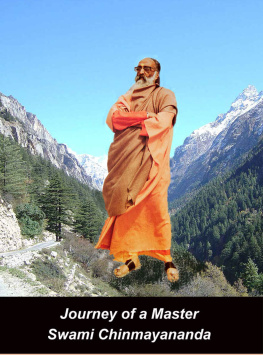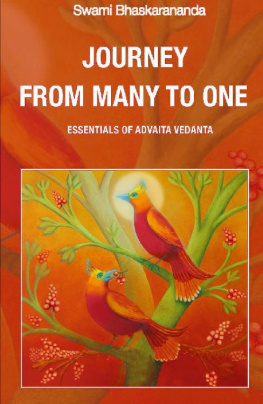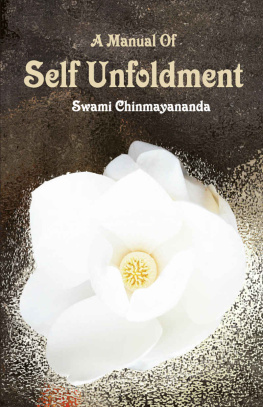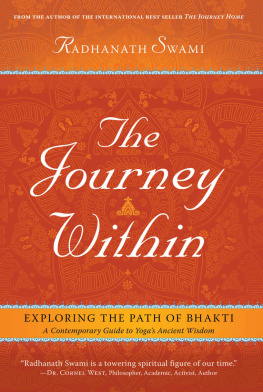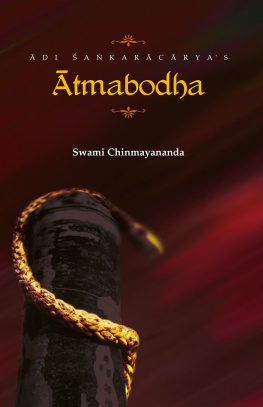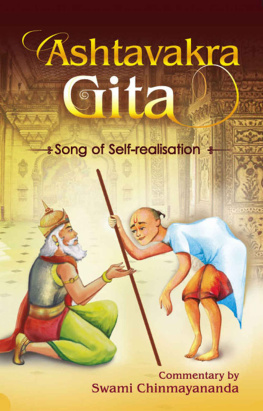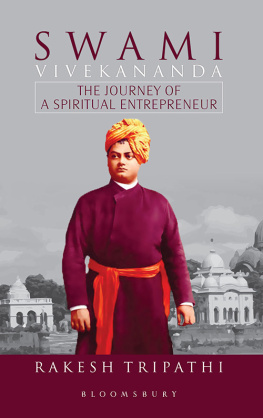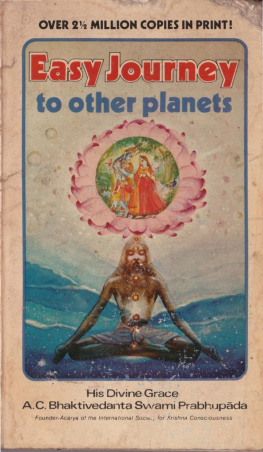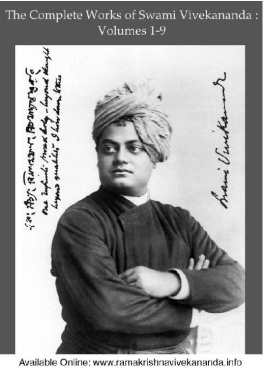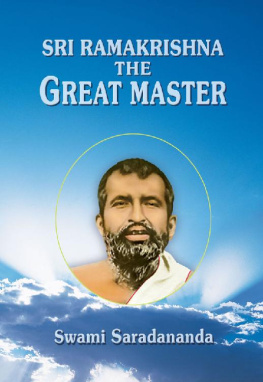Nancy Freeman Patchen - Journey of a Master: Swami Chinmayananda
Here you can read online Nancy Freeman Patchen - Journey of a Master: Swami Chinmayananda full text of the book (entire story) in english for free. Download pdf and epub, get meaning, cover and reviews about this ebook. year: 2013, genre: Religion. Description of the work, (preface) as well as reviews are available. Best literature library LitArk.com created for fans of good reading and offers a wide selection of genres:
Romance novel
Science fiction
Adventure
Detective
Science
History
Home and family
Prose
Art
Politics
Computer
Non-fiction
Religion
Business
Children
Humor
Choose a favorite category and find really read worthwhile books. Enjoy immersion in the world of imagination, feel the emotions of the characters or learn something new for yourself, make an fascinating discovery.
- Book:Journey of a Master: Swami Chinmayananda
- Author:
- Genre:
- Year:2013
- Rating:5 / 5
- Favourites:Add to favourites
- Your mark:
- 100
- 1
- 2
- 3
- 4
- 5
Journey of a Master: Swami Chinmayananda: summary, description and annotation
We offer to read an annotation, description, summary or preface (depends on what the author of the book "Journey of a Master: Swami Chinmayananda" wrote himself). If you haven't found the necessary information about the book — write in the comments, we will try to find it.
Journey of a Master: Swami Chinmayananda — read online for free the complete book (whole text) full work
Below is the text of the book, divided by pages. System saving the place of the last page read, allows you to conveniently read the book "Journey of a Master: Swami Chinmayananda" online for free, without having to search again every time where you left off. Put a bookmark, and you can go to the page where you finished reading at any time.
Font size:
Interval:
Bookmark:
Journey of a Master
Swami Chinmayananda
by
Nancy Freeman Patchen
Dedicated to all the wonderful people of India; those who have touched my life and given me a hand and a kind word and those I have never met. With a special thanks to Swami Chinmayanandas family and early devoteeswithout whom this book could not have been written.
Copyright 1988, 2013 by Nancy Freeman Patchen
To the Reader
This book is written so that the average person who is interested in India will be able to gain an in depth understanding of a reality unknown to the West, so it is not a scholarly rendition, although it has a thorough explanation of the many realities. The land named India by its conquerors has a unique mind set. So you will encounter many new ideas. You must read the book through with an open mind in order to get a complete picture before attempting to make any assessments or judgments. Although I have attempted to communicate as clearly as possible, the many new concepts and words of the Indian culture have made it difficult.
Therefore, I suggest that if you do not comprehend the nuance of an idea or word that you put it in the back of your mind, for the term will surely come up again in the text. In this manner, you will continue broadening your understanding of the various concepts.
I know the long Indian names (especially in Kerala) and many Sanskrit words in several sections are vexingbut they are essential. Sanskrit is intimidating. In the first place, it has 52 letters, so its impossible to make an accurate transliteration with 26 letters. For example, there are three s sounds. Another hint is Hindi uses Sanskrit words, but takes off the ending vowel.
Again the Indian mind set and philosophy is unique; there are no accurate English translations for many of the essential words. When the sense of a word has been narrowed by the English translation, I have put the Sanskrit word in parentheses after it (for the sake of Indians). In direct quotations, I did not take that liberty; there, I placed the English translations in brackets after the Sanskrit word. When the word was a common one, after using it several times, I began to incorporate the Sanskrit term into the text.
Bottomline : Keep an open mind! It will be worth it as you encounter new realities and new ways of looking at life.
With love and good wishes for an expanded mind,
Nancy
Table of Contents
Student and Disciple of Himalayan Masters
Can I do it?
Can I face the educated class of India and bring to their faithless hearts at least a ray of understanding of what our wondrous culture stands for? Sitting on the banks of the roaring Ganga, I shivered as I pondered the thought. None could argue against the Eternal Truth that man is in essence God. But could I explain it to others? Sitting, watching the Mother Ganga in her incessant hurry, I seemed to hear the words interlaced in her roar, Son, dont you see me; born here in the Himalayas, I rush down to the plains, taking with me both life and nourishment to all in my path. Fulfillment of any possession is in sharing it with others. I felt encouraged, I felt reinforced. The urge became irresistible!
Thus was born the idea that was to take Swami Chinmayananda throughout India and to parts of the world never touched by the sacred waters of the Ganga to share the secrets of life that he had learned in the valleys of the Himalayan peaks. The Vedanta philosophy that he would teach was studied exclusively by scholars of religion in Indian universities and by swamis in their huts and ashrams . But did this ancient knowledge have any significance for the average man struggling with his mundane problems in his daily life? This is the question that Swami Chinmayananda was to address in his lifes mission.
In the forty years of his carrying out that inspiration, Swami Chinmayananda met and overcome many obstacles in his journey. As surely as the Ganga leaps high as she meets boulders in her course and lays out a new pathway when she encounters obstructions in her one-pointed concentration to bring her fresh waters to the Bay of Bengal, the Swami has opened new pathways in spite of ominous odds. The Swami never seemed to need rest as he meets his 365 day-a-year, sixteen-hour daily schedule, which includes two or three public classes and lectures. His constant outpouring of love and humor, criticism and encouragement, insight and enthusiasmwith equal attention to both the spiritual and material needs of the studentshas resulted in the changed lives of thousands of people.
His life represents a model of one who pursues a goal with concentrated dedication; thereby demonstrating in his own life the secrets of success that he shares with others. By the end of his life, with the assistance of many inspired workers, he had built a foundation and structure for a spiritual renaissance in India.
He completed over 400 ten-day lecture series on the Hindu Vedantic texts. Over two hundred Chinmaya Mission centers coordinate hundreds of study groups to keep the ideas planted in the lecture series fertile and growing. Six centers for intensive study of the scriptures now exist; one offers classes in English and the remainder in the native Indian languages of Hindi, Kannada, Malayalam, Tamil and Telegu. The Chinmaya Yuva Kendra groups for college students provide a forum for comprehensive understanding of the scriptures with avenues of service and creative activities to channel the energy of the students into noble goals. Over half a million children belong to the Bala Vihar groups, which were organized to give the youngsters a knowledge and appreciation of their cultural and religious heritage.
Through his influence, attention has also been given to the material aspect of life: nursery schools, elementary schools and colleges have been founded to educate the young people of India with the necessary skills for their material success. Many service organizations have been initiated, including retirement homes for the elderly, hospitals, diagnostic centers, training courses for nurses, free food centers and slum renovation programs. These projectsinspired, established and run by individuals from the communityfurnish a field of service for those dedicated to the ideals of the Eternal Truth [ Sanathana Dharma ] expounded by Swami Chinmayananda.
We were accused of much more than we actually did, although we didnt mindlet those British think the worst of us! That was our attitude.
Swami Chinmayananda, 1958
In 1951 when Swami Chinmayananda left the heights of the Himalayan valleys for the plains of h is homeland, India was only eight years into her independence from the British. His mission was a response to a restless society. Two hundred years of alien rule had left its scar in every arena of lifecultural, political, economic, religiousand, equally devastating, the loss of the natives confidence in their self-worth. A religious and cultural identification had provided a unity for two thousand independent kingdoms of many languages and distinct customs for centuries. People of this region traced their origin to Bharata (One who revels in light), the legendary king immortalized by the poet Kalidasa in the great epic Shakuntala :
That which lies to the north
of the oceans;
That which lies to the sout h
of the snow-capped mountains;
That is named Bharata;
for it is the home of the Bharatis.
This unique cultural and religious foundation that united the Indian subcontinent had been seriously undermined by foreign rulers just at the time that consolidation into a nation was to occur. Consequently, a civilization of four thousand years was embarking on the monumental task of building a vital nation not as an organic, natural development, but in a great leap, without the roots of its foundation.
Font size:
Interval:
Bookmark:
Similar books «Journey of a Master: Swami Chinmayananda»
Look at similar books to Journey of a Master: Swami Chinmayananda. We have selected literature similar in name and meaning in the hope of providing readers with more options to find new, interesting, not yet read works.
Discussion, reviews of the book Journey of a Master: Swami Chinmayananda and just readers' own opinions. Leave your comments, write what you think about the work, its meaning or the main characters. Specify what exactly you liked and what you didn't like, and why you think so.

